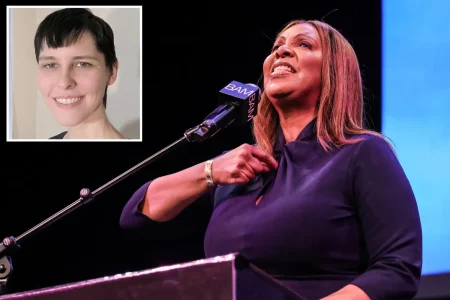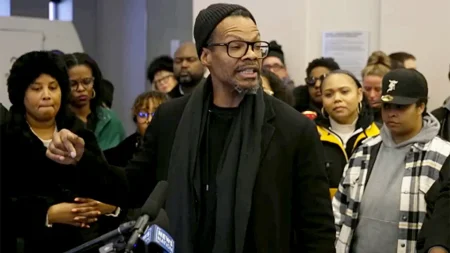America at a Crossroads: Trump’s Approach to Free Expression Raises Global Concerns
Democracy’s Cornerstone Under Pressure as US Joins Worrying Global Trend
In a world where the beacon of free expression flickers with increasing vulnerability, the United States finds itself in an unexpected position. Long considered the standard-bearer for press freedom and democratic expression, America now stands at a crossroads as the tactics employed by President Trump throughout his presidency have placed the nation in uncomfortable company. Freedom of expression—that fundamental pillar of democratic governance—is experiencing a marked decline in dozens of countries worldwide, with troubling implications for the future of global democracy. The rhetorical and policy approaches to media and free speech adopted by the administration have drawn comparisons to methods typically associated with countries where democratic norms have been systematically weakened, raising alarm among press freedom advocates, constitutional scholars, and democratic institutions worldwide.
The Rhetoric of Delegitimization and Its Global Echoes
President Trump’s persistent characterization of the press as “the enemy of the people” and purveyors of “fake news” represents more than mere frustration with negative coverage—it mirrors language employed by authoritarian leaders seeking to undermine independent media. This rhetorical strategy has real-world consequences both domestically and internationally. Within American borders, it has contributed to unprecedented hostility toward journalists at political rallies and diminished public trust in traditional news sources. More concerning, however, is how these verbal attacks have provided cover for actual authoritarians worldwide. Leaders in countries like the Philippines, Hungary, Turkey, and Brazil have adopted Trump’s “fake news” terminology to dismiss legitimate reporting on corruption, human rights abuses, and democratic backsliding. Media watchdog organizations have documented how this American-exported language has preceded actual crackdowns on press freedom in multiple regions, creating a troubling ripple effect as the vocabulary of delegitimization spreads globally. The phenomenon represents what press freedom advocates describe as a “democratic recession” in which even established democracies are showing symptoms of eroding safeguards for free expression.
Legal Precedents and Institutional Challenges
Beyond rhetoric, the Trump administration has pursued concrete actions that raise constitutional questions about the boundaries of executive power regarding free expression. The Justice Department’s pursuit of whistleblowers, attempts to block publication of unflattering books, threats to revoke broadcast licenses, and calls to alter libel laws to make it easier to sue media outlets all represent departures from traditional presidential approaches to press criticism. Constitutional scholars note that while previous presidents have had contentious relationships with the media, few have sought to use the machinery of government to constrain criticism. This approach bears uncomfortable similarities to tactics employed in countries like Poland and Hungary, where democratic institutions have been systematically weakened through seemingly legitimate legal channels. The pattern of using administrative powers, regulatory bodies, and legal threats to pressure media organizations represents what scholars call “soft authoritarianism”—a process that works within democratic frameworks to gradually diminish institutional protections for free expression. While the American system’s checks and balances have thus far prevented the most serious encroachments, the normalization of such approaches creates lasting vulnerabilities in democratic safeguards.
The Digital Battlefield: Social Media, Disinformation, and Democratic Discourse
The challenges to free expression in the contemporary era extend beyond traditional media to the digital realm, where the administration’s approach to social media platforms has raised additional concerns. President Trump’s executive order targeting Section 230 protections for social media companies followed Twitter’s decision to fact-check his tweets—a move critics viewed as an attempt to intimidate platforms into allowing misinformation to spread unchecked. This intersection of presidential power with digital communication represents a new frontier in the debate over free expression, one with profound implications for democratic discourse. Digital rights experts point to similar patterns in countries like India, Brazil, and Russia, where governments have pressured platforms to remove critical content or face severe penalties. The manipulation of social media environments through coordinated disinformation campaigns, bot networks, and algorithmic exploitation has become a hallmark of modern attacks on free expression globally. What distinguishes democracies from authoritarian systems is typically the government’s response to these challenges—whether they work to promote factual discourse or exploit digital vulnerabilities for political advantage. The blurring of these lines in American governance signals a concerning convergence with practices previously associated with less democratic systems.
Global Repercussions: America’s Changing Role in Defending Press Freedom
Perhaps most consequential is how the administration’s approach has transformed America’s historical role as a defender of press freedom worldwide. For decades, the United States served as a crucial advocate for journalists facing persecution, providing both moral leadership and practical support through diplomatic channels and international organizations. This influence has diminished significantly as the administration has withdrawn from traditional human rights leadership roles and embraced leaders known for suppressing free expression. The failure to meaningfully respond to the murder of Washington Post columnist Jamal Khashoggi represents a stark departure from previous administrations’ approaches to attacks on journalists. Freedom House, the Committee to Protect Journalists, and other monitoring organizations have documented how American retreat from this traditional advocacy role has coincided with increased impunity for those targeting journalists globally. Countries previously restrained by potential American diplomatic pressure now operate with reduced concern for consequences when silencing critics. Media freedom organizations have recorded over 400 journalists imprisoned worldwide—the highest number in three decades—with many held in countries where American influence has waned. This global leadership vacuum has accelerated the broader trend of democratic backsliding across multiple continents as aspiring authoritarians observe that the costs of repression have diminished.
Preserving Democratic Foundations: The Path Forward
The relationship between free expression and democratic governance remains fundamental—when one weakens, the other inevitably follows. The current moment demands renewed commitment to protecting the institutional safeguards that maintain the marketplace of ideas essential to democratic function. Media organizations, civil society groups, judicial institutions, and engaged citizens all play crucial roles in preserving the space for free expression against encroachment. International cooperation among democratic nations becomes increasingly vital as America’s traditional leadership role evolves. Press freedom advocates emphasize that the trends affecting American democracy reflect global patterns rather than isolated developments—what political scientists call “democratic erosion” occurs gradually through incremental changes that individually might seem insignificant but collectively transform the nature of governance. The resilience of American democratic institutions will be determined not by any single administration but by the collective response to these challenges. Constitutional scholars note that democracies historically decline not through dramatic collapses but through slow processes of institutional weakening and normative shifts that eventually render protective systems ineffective. The current crossroads presents both danger and opportunity—a chance to strengthen democratic foundations through renewed commitment to the principles that distinguish free societies from their authoritarian counterparts. As press freedom advocate Joel Simon observed, “The defense of free expression begins with recognition of its fundamental value to democratic life—when we lose sight of that connection, we open the door to its erosion everywhere.”







